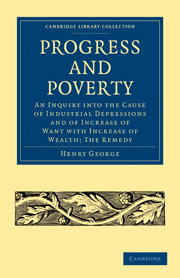 Progress and Poverty
Progress and Poverty Published online by Cambridge University Press: 07 September 2011
There is a delusion resulting from the tendency to confound the accidental with the essential—a delusion which the law writers have done their best to extend, and political economists generally have acquiesced in, rather than endeavored to expose—that private property in land is necessary to the proper use of land, and that to again make land common property would be to destroy civilization and revert to barbarism.
This delusion may be likened to the idea which, according to Charles Lamb, so long prevailed among the Chinese after the savor of roast pork had been accidentally discovered by the burning down of Ho-ti's hut—that to cook a pig it was necessary to set fire to a house. But, though in Lamb's charming dissertation it was required that a sage should arise to teach people that they might roast pigs without burning down houses, it does not take a sage to see that what is required for the improvement of land is not absolute ownership of the land, but security for the improvements. This will be obvious to whoever will look around him. While there is no more necessity for making a man the absolute and exclusive owner of land in order to induce him to improve it, than there is of burning down a house in order to cook a pig; while the making of land private property is as rude, wasteful, and uncertain a device for securing improvement, as the burning down of a house is a rude, wasteful, and uncertain device for roasting a pig, we have not the excuse for persisting in the one that Lamb's Chinamen had for persisting in the other.
To save this book to your Kindle, first ensure no-reply@cambridge.org is added to your Approved Personal Document E-mail List under your Personal Document Settings on the Manage Your Content and Devices page of your Amazon account. Then enter the ‘name’ part of your Kindle email address below. Find out more about saving to your Kindle.
Note you can select to save to either the @free.kindle.com or @kindle.com variations. ‘@free.kindle.com’ emails are free but can only be saved to your device when it is connected to wi-fi. ‘@kindle.com’ emails can be delivered even when you are not connected to wi-fi, but note that service fees apply.
Find out more about the Kindle Personal Document Service.
To save content items to your account, please confirm that you agree to abide by our usage policies. If this is the first time you use this feature, you will be asked to authorise Cambridge Core to connect with your account. Find out more about saving content to Dropbox.
To save content items to your account, please confirm that you agree to abide by our usage policies. If this is the first time you use this feature, you will be asked to authorise Cambridge Core to connect with your account. Find out more about saving content to Google Drive.